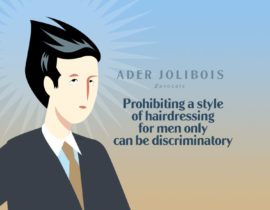- Home
- >
- Social Law
- >
- Sexist joke: a limit to freedom of speech?

Can a sexist joke constitute a limit on freedom of speech?
Focus on the judgment delivered by the social chamber of the Court of Cassation on April 21, 2022: A sexist joke can constitute a limit on freedom of expression
Cass. soc. 20 avril 2022 n° 20-10.852
The Social Chamber rules that the dismissal of a television host who made a sexist “joke” was, in view of various factors, a proportionate sanction which does not excessively infringe the freedom of expression guaranteed to an employee.
The facts and the procedure
The dismissal concerned the employee of an audiovisual production company for which he hosted a game show. In this program, the host put couples in competition to the test of questions asked about their love life.
The host’s employment contract committed him to respect the charter of the television channel in charge of broadcasting the program: this charter required him not to make comments of hatred or contempt on the grounds of sex and not to promoting gender-based violence, regardless of the media in which it appears.
In 2017, this host, who was also a comedian, was the guest of a program broadcast on another channel, to promote his latest show. At the end of this program, he was offered to make a final joke, which he formulated in these terms: “Since it’s a super sensitive subject, I’ll try it: you guys know what we tell a woman who already has two black eyes? – She’s terrible that one! – We don’t tell him anything anymore, we’ve already explained to him twice! “.
This “joke” sparked a lively controversy.
A few days later, during the recording of episodes of the game of which he was the host, the interested party alluded to the criticisms that his joke earned him and added comments of the same nature.
The audiovisual production company fired the host for serious misconduct.
The Labor Court and then the Court of Appeal ruled that this dismissal was justified.
The main questions put to the Court of Cassation
Did the remarks alleged against the employee constitute a fault of the employee in the performance of his employment contract?
Does the freedom of expression guaranteed to the employee preclude his dismissal when the alleged remarks are presented as a joke?
The response of the Court of Cassation
Landmarks: Freedom of Expression and the Employment Relationship
Freedom of expression is protected by article 11 of the Declaration of the Rights of Man and of the Citizen and article 10 of the European Convention for the Protection of Human Rights. It applies to the employment relationship.
The social chamber of the Court of Cassation has ruled for many years that, barring abuse, the employee enjoys his freedom of expression inside and outside the company.
This freedom may be subject to restrictions justified by the nature of the tasks to be performed. But these restrictions must be proportionate to the aim sought.
According to the European Court of Human Rights, a judge seized of a dismissal based on the comments made by an employee must verify:
- that the possibility for the employer to interfere with freedom of expression is provided for by law;
- that this restriction of freedom of expression pursues a legitimate aim;
- that the dismissal is necessary and proportionate to the legitimate aim pursued by the employer.
In this case, the salaried animator was bound by his employment contract to respect a charter by which he undertook not to make any comments with a sexist connotation. Therefore, the fact of making these remarks constituted a contractual fault.
A limitation of freedom of expression pursuing a legitimate aim
The salaried host made sexist remarks on the air while several recently publicized events reminded us of the need to fight against domestic violence and gender discrimination (Weinstein case, freedom of speech for women on social networks with the “#MeToo” and “#BalanceTonPorc” movements, announcement by the President of the Republic of measures aimed at combating gender-based and sexual violence).
By limiting the freedom of expression of its host, the audiovisual production company was pursuing a legitimate aim of combating this type of behavior and protecting its reputation and its rights.
A dismissal proportionate to the legitimate aim pursued by the employer
In the television program of which he was the guest, the comedian made sexist remarks which he presented as a “joke”, but at the very end of the program, without it being possible to distance.
The following days, on the set of his own game show, the host was satisfied with the controversy, while repeatedly making misogynistic and abusive remarks towards the candidates.
Given this reiteration of sexist remarks, trivializing violence against women, and the commercial risk that weighed on the production company, the television channel threatening to no longer broadcast the program, the dismissal of the host did not carry a disproportionate interference with the freedom of expression guaranteed to the employee.
By this decision, the Court of Cassation does not judge that a comedian does not have the right to make such a “joke” on television. Indeed, the Court of Cassation places itself here within the framework of the employment contract that the person concerned had signed to exercise a profession of presenter on television: it judges that with regard to the clauses provided for in the employment contract and the circumstances, concerning both the employee and the employer, which surrounded this “joke”, the dismissal did not constitute a disproportionate attack on the employee’s freedom of expression.
Related Posts
Recent Articles
- Faced with crises and challenges, let’s dare to transform the social business model
- Prohibiting a style of hairdressing for men only can be discriminatory
- The obligation of balanced representation of women and men at work
- Sexist joke: a limit to freedom of speech?
- Disagreement with your Boss: Free Speech or Not?




